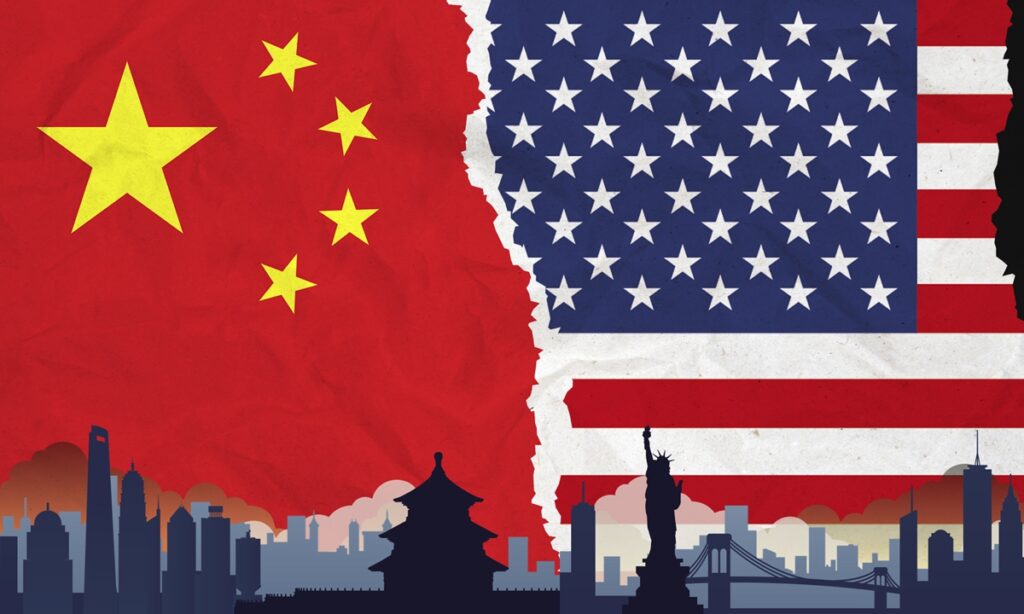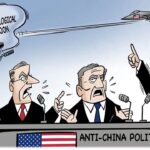The “balloon episode” continued to weigh on already strained China-US relations as Chinese authorities voiced strong dissatisfaction and opposition on Thursday to the latest resolutions passed by the US Congress, urging some US politicians to stop escalating tensions over the incident and stop smear campaign against China.
With Washington sending mixed signals in recent days, including seeking dialogue with Beijing, especially the possibility of a high-level meeting between Chinese and US senior diplomats in Europe, Chinese officials and experts said the US should not ask for communication while fanning flames.
Shortly after the Senate unanimously passed a pair of resolutions on Wednesday “condemning China for sending a surveillance balloon over the US,” China expressed strong dissatisfaction and firm opposition toward it, urging the US Congress to respect the facts, the spirit of international law and basic norms of international relations, the Chinese Foreign Ministry said on Thursday.
The US should immediately stop smearing and slandering China and stop any moves that will further escalate the situation, said Wang Wenbin, spokesperson of the ministry.
Also on Thursday, the Foreign Affairs Committee of the National People’s Congress of China said that it strongly condemns and opposes the US House of Representatives passing a so-called resolution over the Chinese balloon incident, which is ill-intentioned hype and political manipulation, and deliberately exaggerates the “China threat.”
The US House of Representatives unanimously backed a resolution on February 9 condemning “the incursion of a Chinese spy balloon” into US airspace recently as “a brazen violation of United States sovereignty.”
China has repeatedly explained to the US that the Chinese civilian airship flew into US airspace due to force majeure. Regretfully, the US’ insistence on shooting it down by force not only set a bad precedent for handling similar incidents in the future, but also put the US into a dilemma, complicating US-China relations with a toxic domestic political environment and leading to an increasingly tense situation that the global community is worried about, some observers said.
However, the possibility of senior officials from the two countries having face-to-face communication in the upcoming Munich Security Conference depends on whether the US creates a positive environment, shows its sincerity and forms its China policy on the basis of mutual respect and equality, observers said.
US in dilemma
US President Joe Biden plans on Thursday to make his “most extensive remarks” yet about the high-altitude Chinese balloon and three other objects that were shot down by US fighter jets, Reuters reported, citing two sources familiar with the discussions.
The US military shot down another airborne object over Lake Huron on Sunday on Biden’s orders, making it the third day in a row that an unidentified object was shot down over North American airspace after a Chinese civilian unmanned airship used mainly for meteorological research purposes was taken down on February 4.
US officials believe that the Chinese balloon that was shot down after crossing continental US originally had a trajectory that would have taken it over Guam and Hawaii, while US intelligence agencies tracked the balloon from its launch and watched as it was inadvertently blown into US airspace, according to US media reports.
It is an international practice to use high-altitude balloons for scientific research. France, the US, Japan and other countries have released a large number of high-altitude balloons for scientific observation. For example, the US has reportedly deployed more than 2,000 high-altitude balloons as of 2018, according to publicly available statistics.
The Chinese Foreign Ministry said the US has released a large number of high-altitude balloons from its own soil and has conducted operations around the world since last May. These balloons have illegally flown over China’s airspace without the approval of the relevant Chinese authorities at least 10 times, including over Northwest China’s Xinjiang Uygur Autonomous Region and Southwest China’s Xizang (Tibet) Autonomous Region.
According to the general rules of international law, in the event of an emergency or force majeure, the illegality of an unmanned aircraft of a country entering the airspace of another country without permission can be exempted.
“The US’ attitude on the incident has been shifting to high-profile hyping from being relatively low key, and it has to swallow the bitter fruits of its actions,” Li Haidong, a professor at the Institute of International Relations at the China Foreign Affairs University, told the Global Times on Thursday.
Some Chinese experts believe that an accident of this nature should have been an occasion for communication between China and the US in order to strengthen mutual understanding, as the high-altitude balloons deployed for weather study could be an opportunity for global research cooperation.
“But in an overly tense situation, the US’ overreaction has led to a series of stupid moves, which have proven to be meaningless,” Lü Xiang, research fellow at the Chinese Academy of Social Sciences, told the Global Times on Thursday.
As the US has retrieved most of the debris of the Chinese civilian airship that was shot down, it can now test its equipment, and “if they honestly look into it without falsification, they will see it’s indeed for civilian use,” Lü said.
“But the Biden administration is under pressure due to widespread anti-China sentiment and narrative among Republicans. Still, it needs to be responsible and tackle the matter seriously, and not allow it to affect the future path of China-US relations,” he added.
Mixed signals
Although US media described the latest resolutions passed by the US Senate as a bipartisan chorus of demands for accountability on Capitol Hill, which joined the House in condemning China over the balloon incident, some officials from the Biden administration hinted at maintaining lines of communication and a possible meeting between China’s top diplomat Wang Yi and US Secretary of State Antony Blinken in Munich.
The US and China have “never stopped communicating and trying to understand each other” despite the cancellation this month of a visit by Blinken, said his deputy, Wendy Sherman, according to the AFP.
The US is also preparing for a possible meeting between Blinken and Wang Yi on the sidelines of the Munich Security Conference this Friday, some US media reported on Wednesday. The Chinese side has not confirmed any such arrangements.
“The window of opportunity for working on China-US relations remains open in the first half of 2023, but depends on whether the US is willing to take this opportunity,” Lü said. Increasingly tense bilateral relations between the world’s two largest economies are sure to send shockwaves over global recovery in the post-pandemic era, and we can see now that US business and industries are under mounting pressure, the expert noted.
“The Biden administration needs to carefully reflect on which direction US-China relations are heading and not let those irresponsible politicians and a toxic political environment mislead the consensus reached by the two heads of state last November,” Lü said.
(Global Times)




